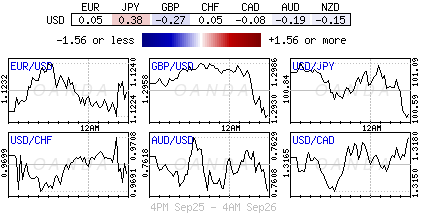Monday September 26: Five things the markets are talking about
Investors’ focus now shifts to the U.S presidential race, which begins this evening (Sept 26, Oct 9 and 19) at Hofstra University, Hempstead, NY at 9pm EDT.
Up to this point, the various asset classes have not really being weighing in on the election outcome, but today should mark the beginning of how each candidate is expected to impact capital markets.
With the Fed standing pat on rates, this week will also be influenced by the energy sector and central bank talk.
OPEC is to hold an informal meeting on the sidelines of an international energy forum Wednesday in Algiers. Reaching an agreement to curtail supplies of crude is questionable; nevertheless, rhetoric from this meeting should have a material impact on global crude oil and equity prices.
On the rhetoric front, the SNB will begin proceeding mid-morning, followed by ECB President Mario Draghi at 10 am EDT and BoC Governor Poloz later this evening just ahead (7.10 pm EDT) of the U.S debates. BoJ’s Kuroda (02.35 EDT) and the Fed’s Yellen will speak on Thursday (4pm EDT), September 29.
1. Global stocks start the week on the back foot
Asian and European bourses remain broadly lower ahead of the U.S open, continuing Friday’s theme as investors pare back hopes of a possible OPEC deal mid-week and as the BoJ reaffirms its commitment to negative rates. NIRP will weigh heavily on global banking and life insurance stocks.
Japan’s Nikkei Stock Average finished the day down -1.3%, while Hong Kong’s Hang Seng Index retreated -1.6% and South Korea’s KOSPI slipped -0.3%.
In early Euro trade, the Stoxx Europe 600 index is down -1%, while FTSE 100 has fallen by the most in two-weeks ahead of the first U.S Presidential debate between Clinton and Trump (latest polls put them neck and neck). Banking and financial stocks are leading the losses across mainland Europe, while commodity/mining stocks leading losses seen in the U.K.
S&P 500 Index futures are set to open -0.5% down.
Indices: Stoxx50 -1.7% at 2,982, FTSE -1.3% at 6,821, DAX -1.5% at 10,468, CAC 40 -1.8% at 4,410, IBEX 35 -1.8% at 8,668, FTSE MIB -1.8% at 16,153, SMI -1.2% at 8,171, S&P 500 Futures -0.5%
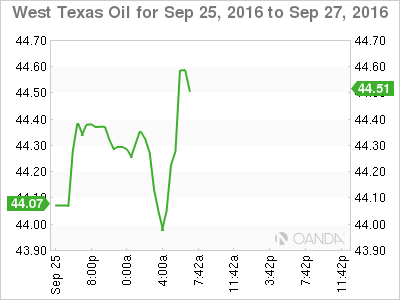
2. Oil investors on edge, gold trying to shine
With OPEC having already failed on a number of occasions this year to impose a production cap, it’s reason enough for the market to have low expectations for any breakthroughs in oil production cuts this week (Sept 27).
The current speculation on what type of outcome to expect at this informal meeting is that there will be a delay in any decision making until November.
Price fell nearly -5% last week, knocked by signs that the Saudi’s and Iran were making little progress in achieving a preliminary agreement to freeze production.
Brent crude futures are trading down -2c at +$45.87 a barrel, while U.S. crude is up +7c at +$44.55 a barrel ahead of the open stateside.
Friday’s CFTC data showed that investors have cut their net long position in crude oil to its lowest in a month.
Gold prices are little changed ($1,336 an ounce) after climbing +2.1% last week. The precious metal’s price swings are expected to become more volatile over the next few months on the back of the U.S. presidential election as investors will look to gold as a hedge against financial uncertainty.
Elsewhere, nickel declined -1.7%, pulling back from a one-month high, while copper retreated -0.3% from its seven-week high.
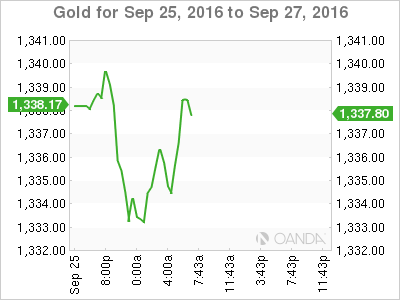
3. Sovereign yield curve continue to flatten
Loose monetary policy decisions by G3 central banks this month is supporting bond prices and flatting sovereign yield curves.
Benchmark sovereign bond prices have rallied again overnight. Germany 10-Year bund yield fell to -0.095%, while JGB’s trade -0.06% and U.S. 10's trade down -1bps at +1.60%.
Fed data reveals that the only natural seller of Treasuries seems to be foreign central banks. They continue to reduce their holdings of U.S. debt for a third consecutive quarter, the most sustained pullback on record.
Unlike the retail investor, who continues to want to own the belly of the curve for two reasons, fear and yield and this despite forex translation costs at the moment.
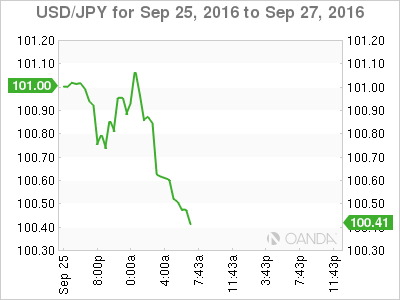
4. “Big” dollar sees mixed results in early trade
BoJ Governor Kuroda’s “jawboning” remains ineffective as Yen continue its rally (¥100.47). Japan MoF official Sakakibara is forecasting USD/JPY to decline toward ¥90 in 2017.
Sterling is trading atop of its one-month low (€0.8691 or $1.2937) on continued concerns about the possibility of a ‘hard’ Brexit – U.K. would be prepared to sacrifice access to the single market. PM May last week reiterated her government would not invoke Article 50 to leave EU before the end of 2016. Market consensus believes that any sterling gains should be savoured in the medium term.
German Ifo data is providing the single unit some early support ahead of the U.S open (€1.1245).
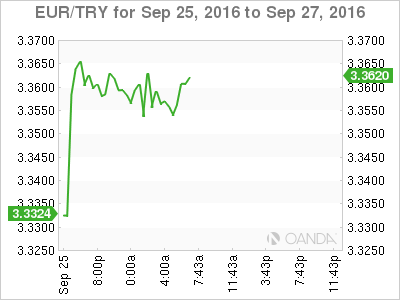
5. German Sentiment rebounds, Turkey debt now junk again
Data this morning showed that German business sentiment brightened unexpectedly this month, hitting its highest level in over two-years (+3bps to 109.5 m/m vs. 106.3 e), as companies were “clearly more optimistic” according to the Ifo institute. The measures of current conditions and expectations also came in well above forecasts. Investors seem confident that the Brexit impact will be limited.
Late last Friday, Moody’s downgraded Turkey’s credit rating on the country’s debt to junk. The rating agency cited the “increase in the risks related to the sizeable external funding requirements and the weakening in previously supportive credit fundamentals, particularly growth and institutional strength” for the move.
It was only natural that TRY come under pressure on the Asian open – it printed a new two-month low just shy of the psychological $3.0000 handle.
